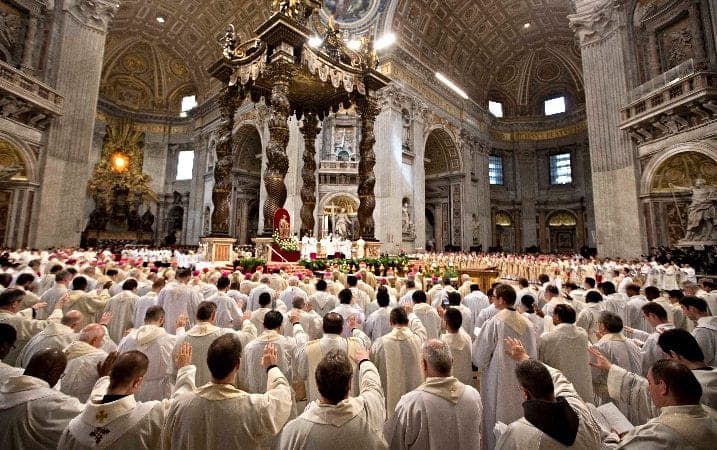ROME — Pope Francis called on priests around the world to defend “the poor, the outcast, and the oppressed” on Thursday, a day marked on the Catholic calendar as a commemoration of the founding of the priesthood by Jesus Christ.
“As priests, we identify with people who are excluded, people the Lord saves,” Francis said in his annual Holy Thursday Mass in the Vatican.
“We remind ourselves that there are countless masses of people who are poor, uneducated, prisoners, who find themselves in such situations because others oppress them,” he said.
Francis added that many times priests can be blind, “lacking the radiant light of faith,” the result of an excess “of complicated theology” and a “bubbly” and “light” spirituality.
The pontiff’s comments came as he was celebrating the Chrism Mass in St. Peter’s Basilica, with priests from the diocese of Rome gathered in the church. This homily is usually the pope’s main annual address to priests, not just in Rome, but across the Catholic world.
Priests are often “trapped” and “oppressed,” the pope said, by a “digital, virtual worldliness” and by “commercial advertisements” which they can’t shrug off “to walk ahead, freely, along paths that lead us to love of our brothers and sisters, to the Lord’s flock, to the sheep who wait for the voice of their shepherds.”
In his homily, Francis spoke about God’s “excessive mercy” telling the religious men they’re called to “help to inculturate” this message of mercy so that it becomes a personal experience.
“This will help all people truly understand and practice mercy with creativity, in ways that respect their local cultures and families,” he said.
According to the pontiff, “God showing excess in his ever-increasing mercy” is especially visible in two areas: encounter and forgiveness.
Francis said that God gives himself in such a way that every encounter leads to rejoicing, and called upon priests to take the time to participate in that celebratory feeling.
“It would be good for us to ask ourselves: after going to confession, do I rejoice? Or do I move on immediately to the next thing, as we would after going to the doctor, when we hear that the test results are not so bad and put them back in their envelope?” he asked.
Regarding the response priests should have to God’s “superabundant forgiveness,” Francis said they’re called to preserve a “healthy tension between a dignified shame and a shamed dignity.”
“It is the attitude of one who seeks a humble and lowly place, but who can also allow the Lord to raise him up for the good of the mission, without complacency,” the pope said.
The chrism Mass is the first of six public events Francis will lead from Thursday to Easter Sunday. Later in the day, he’s scheduled to celebrate the Mass of the Last Supper at a Center for Asylum Seekers in Castelnuovo di Porto.
In this center, he’ll wash the feet of 12 people, imitating Jesus’ gesture with the Apostles: An Italian Catholic woman who works at the center, three women who belong to the Eritrean Orthodox Tewahedo Church, four Nigerian Catholic men, a Hindu man, and Muslim men from Syria, Pakistan, and Mali.
The center in Castelnuovo di Porto, about 15 miles north of Rome, holds close to 900 guests and has more than 100 employees.
Explaining the symbolic value of Francis’ decision to bend down to wash the feet of refugees, Archbishop Salvatore “Rino” Fisichella, head of the Vatican office organizing the Holy Year of Mercy, said the pope’s actions “mean to tell us that it is important to pay due attention to the weakest in this historic moment, that we are all called to restore their dignity without resorting to subterfuge.”
On Friday, the pope will preside over the service of the Passion of the Lord and the Way of the Cross. The text for this prayer, which will take place in Rome’s Coliseum, was written by Italian Cardinal Gualtiero Bassetti of Perugia.
It’s tradition for the pope to each year ask a different person to write the meditations and prayers that are read after each station is announced.
“For every station, I tried to make a reference to current events because, as Pope Francis says, ‘God is real and shows himself today’,” Bassetti told the Vatican newspaper, L’Osservatore Romano.
His meditations speak of victims of abuse, modern day martyrs, those persecuted, the unemployed, the poor, orphans, and those whose families have broken up.
In the meditations he wrote for the third station, “Jesus falls for the first time,” Bassetti asks a question posed by many throughout history, “Where is God?”
“There are situations that seem to negate the love of God,” he wrote. “Where is God in the death camps? Where is God in the mines and factories where child slaves work? Where is God in the rickety boats that sink in the Mediterranean?”
Bassetti’s meditation for each station is divided into reflections and prayers. The prayer for the third is for those situations of suffering “that seem to have no sense,” including “Christians killed in hatred of the faith, for the victims of every kind of persecution, for enslaved children, [and] for the innocent who die in wars.”
On Saturday, Francis will preside over the Easter vigil in St. Peter’s Basilica, and on Easter Sunday he’ll celebrate an open air Mass in St. Peter’s Square, after which he’ll deliver his Urbi et Orbi blessing: to the city and to the world.
















